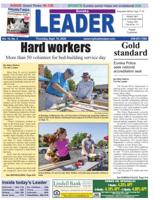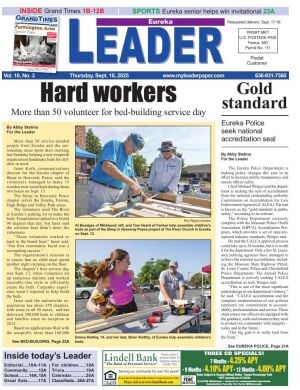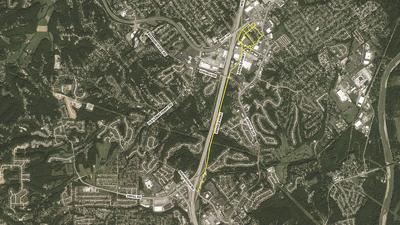The state auditor has asked a judge to dismiss a request from Arnold city officials looking for permission to withhold some records the Auditor’s Office is seeking. The Auditor’s Office has requested the records as part of its audit of the city and two transportation development districts related to the abandoned Arnold Parkway road project, court records show.
On May 2, Auditor Scott Fitzpatrick filed an answer and counterclaim to a lawsuit Arnold filed on April 2 seeking a temporary restraining order, preliminary injunction and permanent injunction to deny the Auditor’s Office request for unredacted closed meeting minutes.
The city’s lawsuit says the release of information from closed meetings would disclose confidential information. It also says the redacted information has nothing to do with the Arnold Parkway project.
“When transparency feels hostile, perhaps a political subdivision has become too used to the cover provided by acting in closed meetings,” the Auditor’s Office says in its answer to the city’s lawsuit.
The Auditor’s Office previously subpoenaed the city to receive unredacted closed meeting minutes as part of its investigation into the scuttled Arnold Parkway project, a proposed $75 million, 2-mile, two-lane road that would have connected Hwy. 141 and Richardson Road. The proposed road project would have required the acquisition of 38 homes, multiple businesses and a portion of the Water Tower Place Shopping Center.
The proposed project spurred state representatives Phil Amato and David Casteel to request the audit. It also led to the Water Tower Place Shopping Center owners to file a lawsuit. In addition, Arnold residents gathered signatures on petitions in an attempt to force recall elections for all city officials, but that effort was abandoned before the required signatures were obtained.
The Auditor’s Office sent a Nov. 7 letter to then-Mayor Ron Counts announcing that it planned to conduct the audit after receiving multiple complaints from its Whistleblower Hotline about Arnold’s oversight and operation of the AARC TDD and the Triangle Transportation Development District. The letter said the Auditor’s Office investigated the complaints and determined they were credible.
The state auditor’s counterclaim to Arnold’ lawsuit blasts city officials, alleging that they are trying to delay the audit of the city, the Arnold Retail Corridor Transportation Development District (ARC TDD) and the old Triangle Transportation Development District. The counterclaim also says that the city’s assertion that the Auditor’s Office is overstepping its authority by requesting unredacted closed meeting minutes is wrong.
“The city has impeded this audit for months and has repeatedly engaged in delay tactics to avoid producing the records requested by the auditor,” the counterclaim says.
Arnold city attorney Bob Sweeney said the city is not trying to avoid turning over records to the Auditor’s Office.
“The city is simply looking for guidance in the release of privileged or confidential information,” Sweeney said. “We were told, in writing, that the scope of the audit was about the Parkway project and the TDD. To my knowledge that has not changed.
“What could city personnel issues, unrelated litigation, or the confidential information related to Arnold citizens have to do with the Parkway or the TDD? The auditor could change the scope of the audit to review the city's closed minute retention, but that has not occurred. It appears that the auditor is simply using this as some sort of political springboard.”
The Auditor’s Office counterclaim says Arnold’s assertions that it should not have to release some information from closed meeting minutes have “no basis in law.”
“To allow the city to refuse to produce unredacted, closed meeting minutes would subvert both the purpose of the audit and the auditor's constitutional and statutory authority,” the counterclaim says.
In its answer to the city’s lawsuit, the Auditor’s Office asks the judge to dismiss Arnold’s petition with prejudice, meaning the lawsuit could not be refiled; to deny the city’s request for the Auditor’s Office to cover its attorneys’ fees and expenses. The answer also says the Auditor’s Office will not ask the city to cover the Auditor’s Office attorneys’ fees, although it has the right to.
Sweeney said the Auditor’s Office should have joined the city to ask the court for guidance about what confidential or privileged information the auditor is entitled to receive.
“Instead, the auditor has chosen to make unsubstantiated accusations about city staff who are simply trying to do their jobs, protecting the city from unnecessary liability,” he said. “Getting a court ruling provides liability protection for everyone involved, including the auditor.”
Answering the lawsuit
Sweeney previously said city officials had provided thousands of pages of documents, spent many hours responding to information requests and dozens of hours in face-to-face meetings with Auditor’s Office representatives.
In its answer, the Auditor’s Office says neither the city nor the TDDs had provided full cooperation during the audit.
“The city and the TDDs have further obstructed the audit by providing ‘thousands of pages of documentation’ that are not responsive to the requests for records that have been made by the auditor or are otherwise wholly irrelevant to the audit objectives,” the Auditor’s Office answer says.
The Auditor’s Office also says in its answer that the city’s assertion that the closed meeting minutes have no relevance to the auditing of a political subdivision is a “complete misstatement of the law.”
“Closed minutes have the utmost relevance to the auditing of a political subdivision, and it is deeply disturbing for a political subdivision to assert in a legal pleading that ‘closed minutes have no relevance to the auditing of a political subdivision,’” the answer said. “Indeed, one of the most common Missouri Sunshine Law violations is a governing body having closed-session discussions on issues that should have been open to the public.”
The auditor’s answer also says the city’s claim that the release of the closed meeting minutes may have a negative impact on protected classes and proprietary information and could allow the perpetration of fraud upon taxpayers is “extremely troubling.”
“This description of the redacted materials suggests the materials the city is trying to hide from the auditor could be damaging to the reputation of the city of Arnold and/or city officials,” the answer says. “If the information revealed in unredacted, closed minutes demonstrates a political subdivision is not violating state law, the information contained in those closed minutes would not be revealed in an audit report . . . Only violations of state law revealed in closed minutes have the potential of being made public in an audit report”
The Auditor’s Office also questions the city’s claim in its lawsuit that releasing the closed meeting minutes could disclose protected proprietary information, scientific and technological information or innovations.
“It is interesting to imagine what scientific or technological information/innovations the city is in possession of that it is trying to shield from the public,” the auditor’s answer says. “(The city) appears to have simply attempted to list every possible avenue for the closure of a public record, instead of focusing on the idea that the auditor is entitled to records that are otherwise closed to the general public.”
Counterclaim
The Auditor’s Office sent a request to City Administrator Bryan Richison on Feb. 28 for city meeting minutes and applicable City Council resolutions about the intent to use eminent domain to complete TDD projects.
The Auditor’s Office is seeking unredacted minutes from closed City Council meetings held on Sept. 5, 2024; Aug. 15, 2024; Aug. 8, 2024; Aug. 1, 2024; June 13, 2024; May 2, 2024; Oct. 19, 2023; and Oct. 6, 2022.
The office said the city sent those minutes, but many of the records were heavily redacted, including some with the following headings: “real estate,” “litigation,” “contract negotiations” and “Arnold Parkway project.
The counterclaim says Richison clarified “that Sweeney did not redact anything related to the Arnold Parkway project. The redactions were discussions and votes on other closed
session items that were not related to the Arnold Parkway project.”
The auditor’s answer says his office needs access to those records to determine if those redacted sections are relevant.
“The city's actions in refusing to recognize the auditor's authority to obtain routine governmental records and thwarting the auditor's ability to carry out his constitutional and statutory duties are egregious and cannot go unchecked,” the counterclaim says.




